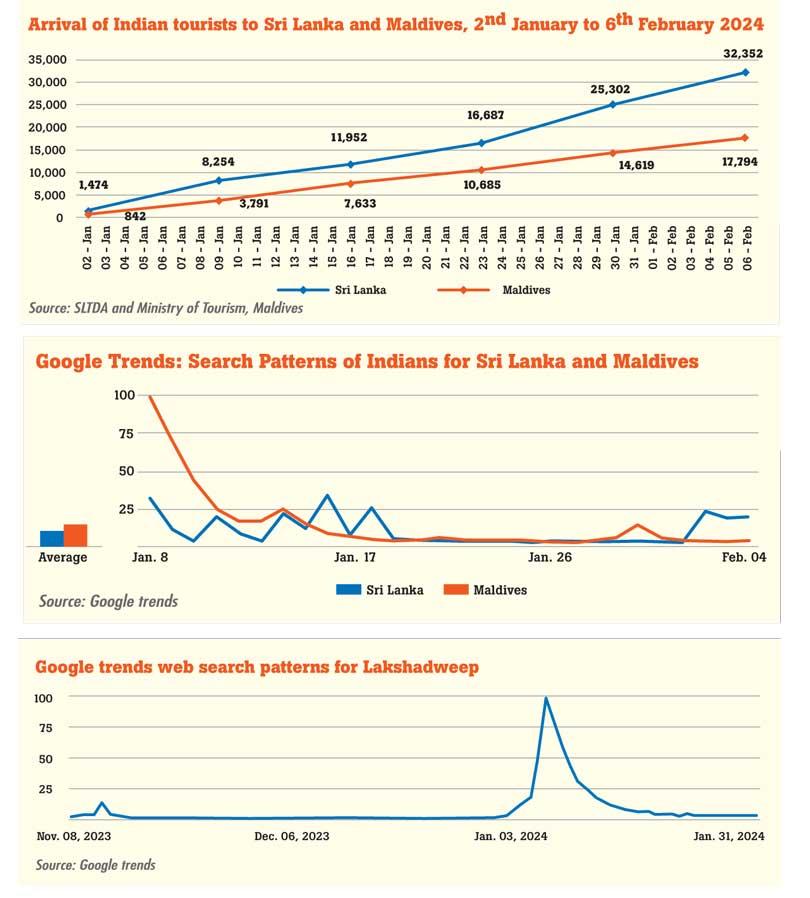05 Mar 2024 - {{hitsCtrl.values.hits}}

Geopolitical tensions wield a profound influence on the global landscape, affecting various sectors, including tourism. As nations navigate diplomatic disputes, conflicts, and geopolitical shifts, the ramifications extend to the tourism industry, shaping traveler behavior, destination preferences, and market dynamics. Geopolitical uncertainties can disrupt travel patterns, deter tourists from visiting certain destinations, and alter the perception of safety and stability.
This can be best illustrated in the recent incident of diplomatic tensions that arose between India and Maldives which led to the #BoycottMaldives movement in India. India’s tourist arrivals in the Maldives for January plummeted to the fifth position, recording just over 13,000 visitors, as per the latest statistics released by the Maldives tourism ministry (Bhutia,2024). Notably, Russia secured the top spot for inbound arrivals during the same period, followed by Italy, China, and the UK. The reason behind this trend stems from allegations made by Indian nationals, accusing Maldivian politicians of making derogatory remarks against Prime Minister Narendra Modi.
The controversy arose from a social media altercation following Prime Minister Modi’s visit to the Lakshadweep islands, where he shared captivating images on a popular social media platform. Following the conflict, EaseMyTrip, an online travel agency, announced the cessation of all flight reservations to the Maldives as a gesture of “standing in solidarity with the nation,” highlighting a significant response to the ongoing dispute (Hindustan Times, 2024). The situation underscores the critical interplay between geopolitical relations and the tourism industry for several reasons as follows.
The rise in Indian tourist arrivals in Sri Lanka, contrasted with the Maldives, may stem from geopolitical tensions. These tensions likely drove Indian travelers to explore other options, favoring Sri Lanka. Moreover, Sri Lanka’s diverse attractions, encompassing beautiful beaches, rich cultural heritage, and picturesque landscapes, appeal to Indian tourists seeking leisure and exploration. The convenience of a free visa, proximity and enhanced connectivity through direct flights further contributed to the surge in tourist numbers from India. Additionally, recent recognitions bestowed upon Sri Lanka have bolstered its reputation as a desirable tourist spot, particularly attracting Indians seeking alternatives to the Maldives.
On the other hand, Prime Minister Modi’s recent post on X underscores the profound influence of social media on the travel sector, as evidenced by several factors.
In conclusion, the interplay between geopolitical tensions and the pervasive influence of social media significantly impacts the travel industry. As experienced in the world history, political disputes, trade wars, and international conflicts create uncertainties that deter travelers and disrupt tourism flows. Moreover, social media amplifies these effects by rapidly disseminating information and shaping public perceptions. The recent events underscore the need for stakeholders in the travel industry to navigate these challenges proactively, leveraging diplomacy, strategic communications, and innovative marketing strategies to mitigate risks and capitalize on opportunities. Ultimately, the ability to navigate these dynamics will be crucial in shaping the future of travel and tourism on a global scale.
(Dinushka Peiris is an Assistant Director in Research at the Sri Lanka Tourism Development Authority. The writer can be contacted on [email protected])
30 Nov 2024 2 hours ago
30 Nov 2024 3 hours ago
29 Nov 2024 29 Nov 2024
29 Nov 2024 29 Nov 2024
29 Nov 2024 29 Nov 2024